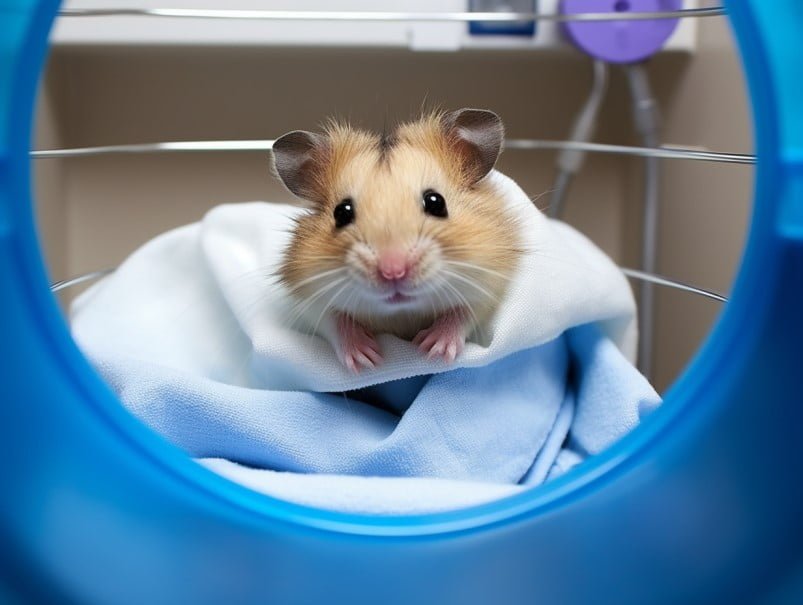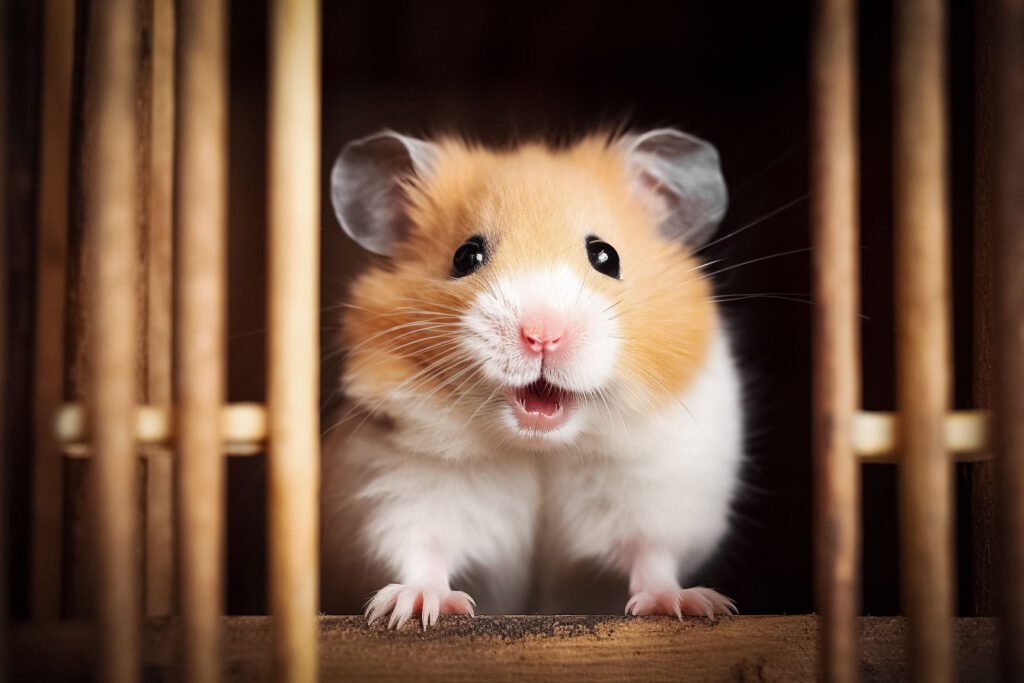Hamster Smell – What You Need to Know
Hamsters, those adorable little furry pets, have a special spot in the affections of many. Yet, a common misconception prevails that rodents, hamsters included, inherently possess a foul odor. This widely-held belief often raises concerns among those contemplating hamster ownership, worrying about potential odors infiltrating their living spaces. In this comprehensive guide, we will delve into the topic of ‘Do Hamsters Smell?’ and provide valuable advice on how to keep their odors at bay
Key Takeaways
- Hamsters are naturally clean animals and do not emit strong odors themselves.
- Proper cage maintenance, including daily cleaning and appropriate bedding, is essential to minimize odors in a hamster’s habitat.
- Female hamsters may emit a musky scent when in heat, but this is temporary.
- Males and females may have different scent intensities, with Syrian hamsters and male dwarf hamsters often having stronger odors.
- Regular cleaning, stress reduction, and proper room placement are key factors in keeping hamster odors in check.
- After a hamster’s passing, prompt burial and thorough cage cleaning are necessary to minimize post-mortem odors.
Understanding Hamster Cleanliness


One of the first things to know is that hamsters, in their natural state, are remarkably clean animals. They have a strong aversion to being dirty and will diligently groom themselves. This self-cleaning behavior is a key reason why hamsters themselves don’t typically emit foul odors. However, the real challenge lies in maintaining a clean hamster cage.
Self-Grooming is Key
Hamsters are self-sufficient when it comes to maintaining their personal hygiene. You’ll often observe your hamster grooming itself by using its paws or nails to clean its fur and skin. This self-grooming process is not only efficient but also essential for their well-being. It helps distribute valuable oils across their bodies, which serve to protect and insulate them.
Unlike some animals that require regular baths, hamsters should never be bathed in water, not even in a shallow amount. Water baths can strip away these essential oils and potentially harm your hamster’s health.
Sand Baths for Happy Hamsters
To facilitate a clean and content hamster, consider providing a sand bath. Sand baths are a natural grooming method for wild hamsters, helping them maintain their skin and fur without the use of water. Additionally, sand baths help disperse the natural oils on their bodies, contributing to a healthy and odor-free hamster.
In summary, hamsters themselves do not have a strong odor, thanks to their dedication to self-grooming. The primary concern for maintaining a fresh-smelling environment revolves around their cage and how well it is maintained.
Tips to Keep Your Hamster’s Home Fresh
Your hamster’s cage is where they spend most of their time, engaging in essential activities like eating, playing, urinating, and defecating. Naturally, this means some degree of odor is inevitable. However, with proper care and maintenance, you can ensure a healthy and odor-free residence for your furry friend.
Cleaning and Soiled Bedding Removal
One of the most effective daily tasks to minimize odor is to remove soiled bedding at least once per day. If your hamster uses a litter box, make sure to clean it regularly as well. This practice significantly reduces the accumulation of urine and feces, keeping the cage smelling fresher between thorough cleanings.
- Remove soiled bedding and check for uneaten food every day to reduce odor buildup.
- Clean the litter box if your hamster uses one to minimize urine odors.
- Keep an eye on specific areas, such as nests and houses, for signs of increased odor and clean them as needed.
However, the frequency of cleaning may vary depending on the cage size and hamster population. While cleaning once a week is a good guideline, it’s essential to adapt cleaning frequency to specific circumstances.
| Cleaning Task | Frequency |
|---|---|
| Full cage cleaning (including toys) | Weekly |
| Bedding change | Weekly |
| Spot cleaning | Daily |
| Litter box cleaning | As needed |


Consider Changing the Bedding
If you’re worried about unpleasant smells coming from your hamster’s cage, it may be worth looking into different types of bedding. There are numerous options available, each with its own advantages and disadvantages. It’s best to select highly absorbent bedding that doesn’t contain any artificial fragrances or dust. It’s also important to choose a non-toxic option that is reasonably priced, so you can replace it as necessary.
It’s advisable to shop around and compare options to find the best bedding for your hamster’s home to keep it clean and fresh-smelling.
| Bedding Type | Characteristics | Odor Control |
|---|---|---|
| Aspen Shavings | Highly absorbent, dust-free, and safe | Excellent |
| Paper-Based Bedding | Absorbent, environmentally friendly | Very Good |
| Cedar/Pine Shavings | Aromatic, potentially harmful to hamsters | Poor |
Spot-Check Nests and Houses
Sometimes, even when the cage appears clean, certain areas may develop odors faster than others. Keep an eye on any nests your hamster forms or the houses you provide for them. If these areas emit stronger odors than the rest of the cage, it may indicate a need for more frequent cleaning.
Tips for Keeping Your Pet’s Odor in Check
If you’re considering bringing a hamster into your home as a new pet, one of the burning questions you may have is, “Do hamsters smell?” We understand the importance of having a pleasant living environment for both you and your furry friend. In this section, we will delve further into managing hamster odors and provide additional tips for keeping them under control.
Understanding Female Hamster Odors
In some cases, female Syrian hamsters, especially when young, may emit a strong, musky smell. This odor can be acrid and even overpowering at times. This scent is often a sign that the female hamster is in heat.
Female hamsters go into heat for a brief period when they become most receptive to male hamsters for breeding. During this time, they release a distinct odor that signals their readiness to potential mates. While this scent serves its purpose in the wild, it can be unpleasant to human noses.
As a hamster owner, there’s little you can do to prevent or eliminate this natural odor during the hamster’s ideal childbearing years. However, rest assured that this phase is temporary and will subside as the hamster matures.
Male vs. Female Hamsters: Who Smells Worse?
The debate over whether male or female hamsters smell worse is a common one among pet owners. Female hamsters come into heat every few days and emit a musky scent during this period, which some find reminiscent of burning rubber. The intensity of the smell varies among species, with Syrian hamsters being known for their stronger scent compared to dwarf hamsters.
Males, on the other hand, release more scent when they are sexually excited, making their odor more pronounced. They also tend to be more aggressive about marking their territory at certain times of the year, resulting in stronger-smelling bedding. In this regard, male dwarf hamsters are reported to have a stronger scent than male Syrians.
| Characteristic | Male Hamsters | Female Hamsters |
|---|---|---|
| Scent Intensity | Pronounced scent, especially when sexually excited | Musky scent during heat cycle |
| Marking Behavior | More aggressive in marking territory | Marking behavior during heat cycle |
| Species Variations | Male dwarf hamsters may have stronger scent than male Syrians | Syrian hamsters often have stronger scent compared to dwarf hamsters |
Tips to Minimize Hamster Odors
To ensure your home remains odor-free while enjoying the company of your hamster, follow these practical tips:
Regular Cage Cleaning
The primary source of potential odors in a hamster’s habitat is the buildup of urine. Hamsters prefer to urinate as far away from their sleeping area as possible to avoid detection by predators. Therefore, regular cage cleaning is crucial to reducing odors. Strike a balance between cleanliness and not disturbing your hamster too much. Cleaning the entire cage with hamster-friendly disinfectant once a week strikes the right balance. Pay special attention to wet areas in their bedding, replacing them every 2 to 3 days.
Check for Signs of Illness
While hamster excrement is generally odorless, foul-smelling and wet stool can be a sign of illness, particularly ‘wet tail,’ a common disease in hamsters. If you notice such changes in their feces, consult a veterinarian.
Remove Hidden Food
Hidden food, especially fresh items like broccoli and cabbage, can rot and produce unpleasant odors. Ensure you remove any uneaten fresh food promptly, and consider the ease of cleaning when choosing your hamster’s cage.
Avoid Giving Baths
It’s not advisable to give hamsters traditional baths or get them wet. Water, especially soapy water, can strip their fur of essential oils needed for insulation, potentially leading to illness. Instead, use a gently moistened tissue to clean specific areas if needed. Providing a sand bath for them to roll around in is another option to help them clean themselves naturally.
Reduce Stress
Anxious hamsters tend to urinate more frequently, leading to increased odors. Interact with your hamster gently to avoid causing stress. Avoid using strong perfumes or aftershaves around them, as their sensitive noses can be easily discomforted.
- Interact with your hamster gently to avoid causing stress, which can lead to increased urination and odors.
- Provide a quiet and comfortable living environment, free from sudden loud noises or disturbances.
- Avoid using strong perfumes or fragrances near your hamster, as their sensitive noses can be easily discomforted.
Consider Room Placement
If you plan to keep your hamster in your bedroom, ensure you maintain a regular cage-cleaning routine. Avoid exposing them to strong sunlight or drafts, as these factors can intensify odors. Additionally, be mindful of noise and activity, as hamsters are sensitive to both.
Conclusion


Hamsters make wonderful additions to households that can provide proper care and cleanliness. With a little effort in maintaining their environment, you’ll find that foul smells are a non-issue, and your hamster will thrive in a fresh and odor-free habitat.
By following these tips and guidelines, you can have a harmonious and odor-free coexistence with your hamster companion. Remember that a clean and well-maintained habitat is key to ensuring your hamster’s happiness and your own peace of mind.
FAQs about Hamster Odor Control
Q: Do all hamsters have a noticeable odor?
No, not all hamsters have a noticeable odor. Hamsters themselves are naturally clean animals and do not typically emit strong odors. However, the cleanliness of their habitat plays a significant role in odor control. Regular cage cleaning and proper maintenance are essential to keeping your hamster’s environment odor-free.
Q: How often should I clean my hamster’s cage?
You should aim to clean your hamster’s cage at least once a week. Remove soiled bedding, clean the entire cage, and replace the bedding with fresh material. Daily spot-cleaning, such as removing soiled bedding and checking for uneaten food, can also help maintain a fresh-smelling cage.
Q: Can I use scented bedding or air fresheners to mask hamster odors?
It’s not recommended to use scented bedding or air fresheners to mask hamster odors. These products may contain chemicals that can be harmful to your hamster’s health. It’s best to use unscented, highly absorbent bedding and maintain proper cleaning practices for effective odor control.
Q: Are there specific bedding types that help with odor control?
Yes, some bedding types are better at controlling odors than others. Aspen shavings and paper-based bedding are excellent choices, as they are highly absorbent and free of harmful fragrances. Avoid cedar or pine shavings, as they can release aromatic oils that may irritate your hamster’s respiratory system.
Q: How can I reduce my hamster’s stress to minimize odors?
Reducing your hamster’s stress can help minimize odors. Interact with your hamster gently and avoid sudden loud noises or disturbances. Provide them with a quiet and comfortable living environment. Stress can lead to increased urination, so keeping your hamster relaxed is beneficial for odor control.



